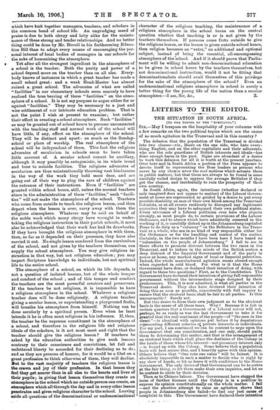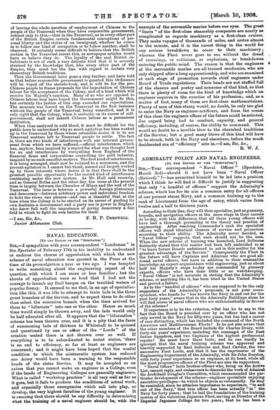LETTERS TO THE EDITOR.
THE SITUATION IN SOUTH AFRICA.
[To THE EDITOR OF THE "Senors:mit." J SIE,—May I trespass on the hospitality of your columns with a few remarks on the two political topics which are the cause of so much agitation in the Transvaal and in this country P
The delusion that the population of the Transvaal is divided into two classes—viz., Boers on the one side, who hate every- thing English, and on the other capitalists and their adherents, who are the sole guardians of British interests and ideals—has done enough harm in the past. Signs are abundant of a desire to work this delusion for all it is worth at the present juncture. Over here and in South Africa a portion of the Press appears to devote itself to representing the Boer leaders as persons who never by any chance avow the real motives which actuate them in public matters, but that these are always to be found in some carefully veiled design to oppress the average Britisher if they get the chance, and incidentally to ruin the prosperity of their own country.
In South Africa, again, the intentions (whether declared or only imagined does not appear to matter) of the Liberal Govern- ment at home are represented as guided by a desire to put every possible disability on men of their own blood among the Transvaal Colonists, or at all events recklessly to disregard any legitimate aspiration they may have to safeguard their own political status. Every utterance of a Liberal politician over here who objects strongly, as most people do, to certain provisions of the Labour Ordinance, and to abuses which have admittedly occurred in the working of it, is carefully dished up in the Johannesburg capitalist Press to do duty as a "calumny" on the Britishers in the Trans- vaal as a whole, who are in no kind of way responsible either for the Ordinance or for the handling and control of the coolies. Certainly, in the two months I have been here I have heard no "calumnies on the people of Johannesburg." I fail to see in these efforts to promote distrust between the two races in the Transvaal, and to induce in the minds of the British section a deep distrust of the Imperial Government and of the party in power at home, any marked signs of local or Imperial patriotism. Indeed, the whole manufactured agitation seems absurd enough when regarded in cold blood. For what is it that the Home Government have done, or declared their intention of doing, with regard to these two questions ? First, as to the Constitution. The Government have declared their intention of giving full responsible government without the intermediate stage designed by their predecessors. This, it is now admitted, is what all parties in the Transvaal desire. They also have declared their intention of doing this as soon as possible, consistently with full inquiry to ensure that the electoral basis shall be fair to all parties. Is this unreasonable ? Surely not.
But this desire to form their own judgment as to the electoral basis is the cause of all these tears. Why ? Because it is felt in certain quarters that a Government of a Liberal colour will not, perhaps, be as ready as was the last Government to take it for granted that the real sentiment of the people—of "the men in the street "—is identical with opinions Put before it by deputations representing different coteries ,4 private interests or individuals. For my part, I am convinced we can be content to urge upon the Government that one consideration, and one only, should guide them in determining this matter, and that is the arrangement of an electoral basis which shall place the destinies of the Colony in the hands of those whose life interest—not pecuniary interest only —is bound up with the Colony. Some believe that a population basis will best secure this, and I heartily agree with this opinion. Others believe that "One vote one value" will be fairest. It is absolutely impossible in such a matter to decide who is right by any show of hands, so let us leave it with confidence to the Home Government. The only desire of that Government can be to arrive at the fair thing, so let them make their own inquiries, and let us be content to abide by their decision.
Then sate Chinese labour. The Government have stopped the issue of further licenses until the Colony is in a position* to express its opinion constitutionally on the whole matter. I fail —and the abortive attempt to raise an agitation shows that people in Johannesburg also failed—to find any just mum of complaint in this. - The Government have declared their intention
of leaving the whale question of employment of Chinese to the people of the Transvaal when they have responsible government, subject only to this,—that in the Transvaal, as in every other part of the British Empire, certain fundamental conceptions of per- sonal liberty and the status of an immigrant, whether he comes in to follow one kind of occupation or to follow another, shall be observed. It certainly seems difficult to believe that the British section in the Transvaal resent this, as newspaper articles would have us believe they do. The loyalty of the real British in- habitants is not of such a very delicate kind that it is severely strained by the knowledge that, like every other part of tho Empire, they must toe the line with regard to certain very elementary British traditions.
Then the Government have gone a step further, and have told us that before responsible government is granted this Ordinance will be wiped off the statute-book, and it will be for the pro- Chinese people to frame proposals for the importation of Chinese labour for the acceptance of the Colony, and of a kind which will receive his Majesty's sanction. Many of us who are opposed to Chinese labour may have hoped the Government might do this, but certainly the justice of this step exceeded our expectations. The measure was forced on the Transvaal in the first instance without the people of the Transvaal being consulted, and it is only right that the Colony, when it embarks on its career of self- government, shall not inherit Chinese labour as a permanent institution.
When thus analysed in cold blood, it must be difficult for the public here to understand why so much agitation has been worked up in the Transvaal by those whose ostensible desire it is to see Transvaal matters left to Transvaal people to settle. The fact is, there are two kinds of interference with our internal govern- ment from which we have suffered,—official interference, which has, anyhow, been inspired by a regard for what was thought best for us, and interference by wirepullinp.; from England of the financial firms and corporations controlling the gold industry, inspired by no such unselfish motives. The first kind of interference, it is being arranged, shall now be reduced to a minimum, and the present agitation is, I cannot but think, nursed and largely worked up by those interests whose desire it is that there shall be the greatest possible opportunity for the second kind of interference continuing under the new system. As Mr. Hull said recently, and as General Botha said the other day, the issue at the present time is largely between the Chamber of Mines and the rest of the Transvaal. The issue is between a powerful foreign plutocracy and democracy—between arbitrary 'power and individual freedom to hold the views one pleases—and one is thankful that at the time when the Colony is to be started on its career of guiding its own destinies a Government and a party are in power in England who know full well the importance of giving democracy a fair field in which to fight its own battles for itself.
Junior Atlienxunt Club.











































 Previous page
Previous page